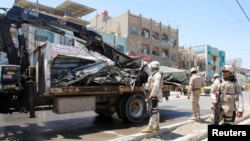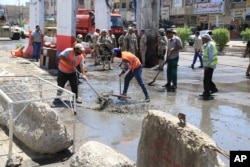Iraq's lawmakers are said to be preparing to begin a fragile process of negotiation aimed at cracking the country's month-long political paralysis.
But ahead of their expected gathering on Tuesday, Islamic State militants attacked Baghdad with a double bombing and a third explosion just north of the capital, killing at least 20 people.
Monday's bombings were a reminder of the dangers of a drawn-out political stalemate. Previous bombings led to a wave of street protests and angry calls for the government leadership to step down
Prime Minister Haider al-Abadi on Sunday addressed parliament, calling on lawmakers to set aside their differences until the ongoing fight for Fallujah was over.
Lawmakers have been deeply divided since Abadi tried to implement government reforms, including replacing a number of ministers with technocrats.
Member of Parliament Shatha al-Obosi told VOA that Monday's parliamentary session would be a chance for lawmakers to move toward a political settlement.
"I think they will be smart and address this step by step," Obosi said. "This is the only way to solve the problem, and get opposition lawmakers to return."
Lost trust of people
Iraq's lawmakers have largely lost the trust of the people, who see the parliament and government ministers as corrupt, ineffective and largely removed from the harsh daily realities of Iraq.
"I hope they get rid of parliament, we don't need it. Things would be better without them," said Ma'ath, the manager of an ice cream shop in Zayouna, a middle-class neighborhood in east Baghdad.
"It was put there by the Americans, and we don't need those people here," he said, referring to the post-Saddam Hussein system of electing political parties who then appoint their lawmakers and parcel out the country's ministerial posts among them.
The so-called quota system is at the heart of the current political impasse.
Opposition lawmakers have demanded that the arrangement be abolished, while others have refused to let go of a structure that guarantees them considerable power.
In nearby Karrada district, on the second floor of a dusty building with a broken-down escalator, the owner of a popular tattoo shop said change was the only answer.
"We should change the government," said the owner, who spoke through a translator on condition that his name not be used.
"We don't have electricity, we don't have water, we don't have security. We need this from the government, and they never do anything about this," he said.
"We should have a revolution by the people, like Egypt," he said, then added, "we need a real solution, but only God knows what that is."
'Need to solve the problem'
Political analyst Mustafa Habib agreed that the political system was flawed, but said talk of revolution was dangerous.
"The problem is that those who want revolution, such as the protesters, they don't have any solutions or programs [policies]," Habib told VOA.
"We need to solve the problem, step by step, and I think the change in Iraq will need to be a deal between Iran and the United States," Habib said.
Iran has significant influence in Iraq, wielded through several leading Shi'ite politicians and their well-armed militias, while the U.S. wields both military power and economic might, Habib explained.







